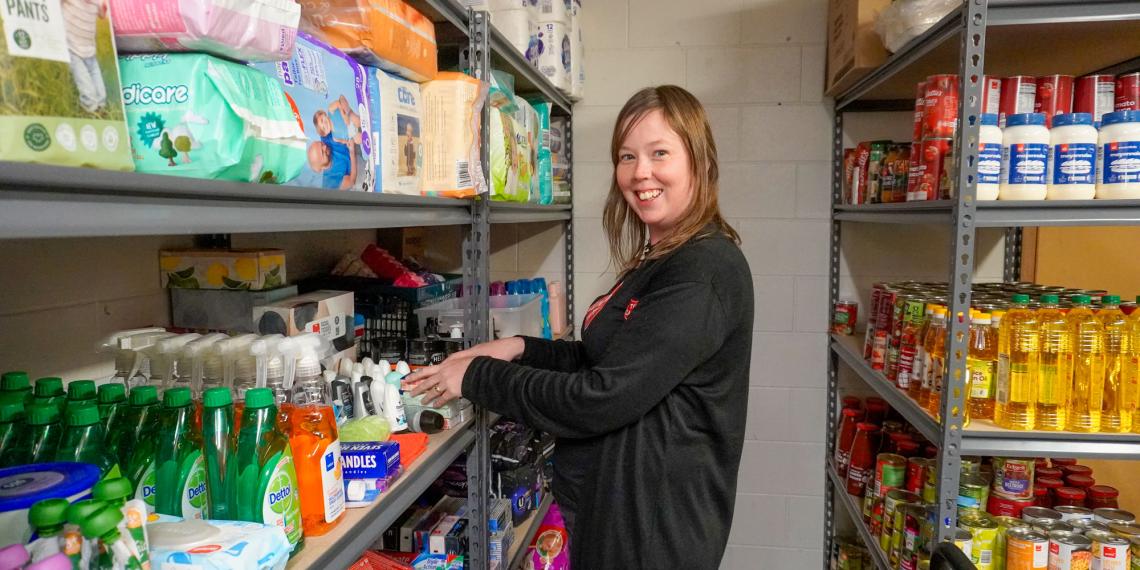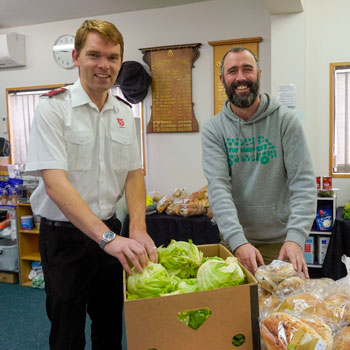Welcome Home

The Salvation Army in Queenstown serves a diverse international population. The shift to Te Kai Mākona, The Salvation Army’s new food security and sovereignty framework, was an easy yes for a team determined to meet the bespoke needs of its migrant communities. The team has worked hard to remove eligibility barriers and adapt their food provision practice to ensure they are a place of welcome and hospitality for all who call Queenstown home.
Te Kai Mākona is The Salvation Army’s re-imagined approach to food hardship in Aotearoa. Mākona means to be fully satisfied and have everything you need physically, emotionally, spiritually and socially. Our vision is to be places of support and connection, strengthening food security and sovereignty for whānau and communities. This new kaupapa offers a mana-enhancing shift in power by returning choice and agency to individuals and families. With a food provision practice that promotes easy access to food supports, holds hospitality high, as well as offering flexible kai plans tailored to meet individual need, Te Kai Mākona has found a firm home in Queenstown.
Real relief
‘Queenstown is unique in that our largest contingent of clients are migrants—people who’ve made their home here and are highly motivated to work,’ explains Centre Leader Lieutenant Andrew Wilson. During the pandemic, work dried up quickly for migrants. The loss of income in a tourist town where the cost of living was already high created lingering financial hardship for some who turned to The Salvation Army for help.
‘Not being able to work during the pandemic was a continuous lament because they’d come to New Zealand to work and contribute to the economy. We worked hard to try and meet the more bespoke dietary needs of our migrant friends, but we were an all-Kiwi team making stereotypical guesses about what a South American or Japanese family might need,’ says Andrew.
The team pivoted quickly as they realised a choice model supermarket would not only serve their community better long-term, but free up the team to focus on aroha (love), manaakitanga (holistic care of a person) and whanaungatanga (relationships)—foundational building blocks of Te Kai Mākona’s kaupapa.
Case Worker Hannelie Potgieter explains that ‘We have people from all over the world who eat and cook differently to the average Kiwi. I recently had a lady who burst into tears with real relief because she could choose her own food. She wasn’t going to be taking away a box full of things her family couldn’t eat—things she didn’t even recognize let alone know how to cook. Baked beans and Wheet-Bix don’t really work here in Queenstown. There is just a totally different feel about the whole process now that we have adopted a choice model in our foodbank.’
‘With Te Kai Mākona, we have a way of slowing things down so we can have authentic conversations,’ says Lieutenant Ruth Wilson. ‘It’s difficult to really connect by handing over a pre-packed food parcel. So, for me it’s about having more space now to build real relationships.’
Barriers Broken
‘In a community with a lot of migrants who have come to New Zealand with low or no confidence, let alone trust in the likes of government agencies, removing eligibility criteria was a huge priority for us,’ explains Andrew. ‘There should be a demonstrable difference between walking into The Salvation Army and walking into a government agency. Te Kai Mākona strongly reflects our values as a Christian organisation. It’s a kaupapa of grace—all people are created in the image of God and have intrinsic value and dignity and are worthy of being heard.’
Volunteer Jason Medina adds that ‘In the past our process required people to fill out a form and go back to WINZ first before we could provide food support—that was a lot of jumping through hoops. Now we can confidently establish with people right from the outset that they are going to get food today. They can relax. That in itself has been such a powerful tool in gaining the trust of the people that come in. That perception and those barriers have been broken down under Te Kai Mākona’s model.’
Heavenly hospitality
 Creating welcoming environments and extending genuine hospitality to those often forced by circumstances outside their control to seek help is not only part of Te Kai Mākona, but intrinsically important to the Queenstown team.
Creating welcoming environments and extending genuine hospitality to those often forced by circumstances outside their control to seek help is not only part of Te Kai Mākona, but intrinsically important to the Queenstown team.
Jason volunteers every week and says ‘I work in the hospitality industry, and I’m passionate about bringing the same level of hospitality I offer to my affluent guests and clientele as I do to the people who come into The Salvation Army. Why wouldn’t I? This keeps me grounded and keeps life in perspective. I love food, and bringing my hospitality flair to what I do here is so rewarding. It doesn’t feel like volunteering because I love being part of the awesome family I’ve found here.’
Alongside their choice model supermarket, Queenstown operates an onsite pātaka kai, affectionately referred to by locals as the community pantry. With fresh produce from Kiwi Harvest and other rescued food from Countdown that is surplus to the needs of the choice model supermarket, the community pantry is open to anyone who needs food support, two afternoons a week.
‘We really wanted to set the community pantry up like a shopping experience—welcoming, inviting and tidy. What happened in the past was rescued perishable food would go down to the family store and be put out on a table by the door. People could take bread as they left the shop but there was no engagement, and it just didn’t feel right,’ says Hannelie. ‘Now there is a level of privacy and normality because it’s set up like a shop and people come in and pick and choose what they need.’
Creating community
‘The community pantry de-stigmatises the whole experience of asking for help,’ adds Jason. ‘There’s no paperwork to fill out and there’s such a warm community environment. We have a nice lounge area set up with tea and coffee and we are finding that people are arriving early—especially our ethnic families, to engage with one another and with us. People are not gapping it straight away afterwards. Initially they would get their food and be gone but not anymore because we have created space for social time. It’s not just about the food, but food has enabled us to build real connection and relationships but on their terms.’
Allowing people to choose the level of engagement and assessment that feels comfortable to them is another facet of Te Kai Makona that Hannelie loves. ‘I no longer have this rule in the back of my mind stating I can only give people three food parcels a year. Instead, we can sit down together over a cuppa and make a kai plan together, which is so empowering and opens the door to talking about what’s really happening. It’s just all a bit calmer and relaxed and not so stressful for them—or us.’
By responding to the unique needs of its community, Queenstown Salvation Army is now enjoying the fruit of their labours—real relationships! Te Kai Mākona has found another place to call home.
